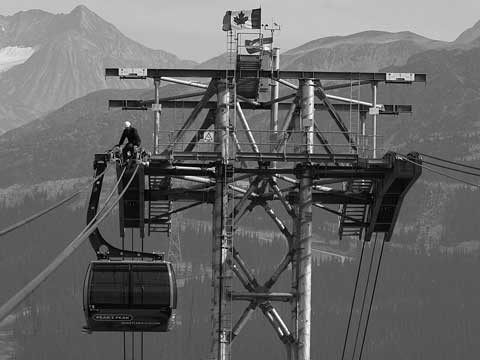Want a piece of Whistler Blackcomb? Soon you may be able to pick it up for $14 to $15 a share on the Toronto Stock Exchange.
In a preliminary prospectus filed with the TSX on Oct. 8, a group of underwriters including CIBC World Markets, RBC Dominion Securities, BMO Nesbitt Burns, TD Securities Inc. and Goldman Sachs Canada Inc. puts a major stake in Whistler Blackcomb Holdings Inc. up for sale to the public.
The prospectus doesn't include a proposed share price or what stake in a new company - Whistler Blackcomb Holdings Inc - will be up for sale. However, Pat Kelly, a Whistler investor and head of the Whistler Real Estate Company, said he got a call from his stock broker who told him the price for the initial public offering (IPO) is going to be set at $14 to $15 a share, with a six to seven per cent yield on the dividend.
That means dividends could make investors anywhere from $0.84 to $1.05 for every share they own.
Once the underwriters, led by CIBC World Markets, take Whistler Blackcomb around on a "dog-and-pony show" to various investors, the company will be made available for public investment, according to Kelly.
Asked how he feels about Whistler Blackcomb going public, he said he's not surprised. He believes the point of the exercise is to help pay down the debts of the parent company, Fortress Investment Group.
"It's not surprising personally," he said. "I'm not surprised they would take their primary asset and try to pay their debts down. It would be more interesting if that money was going to be reinvested back into Whistler and the mountains.
"It's being used to pay down Intrawest and Fortress's debts, it's not going to be going back into lift operations or more capital infrastructure."
In total, 37 million shares are being made available for purchase, according to Kelly, with 21 million going to the public and outside institutions. Intrawest and Nippon Cable, which appears to have increased its stake in Whistler Blackcomb from 23 to 25 per cent, will own the remaining shares of Whistler Blackcomb Holdings.
The new company was registered Oct. 4. Intrawest CEO Bill Jensen is chair of the board of Whistler Blackcomb Holdings. Other board members include Wes Edens, principal of Fortress Investment Group LLC; John Furlong, formerly chief executive officer of the Vancouver Organizing Committee for the 2010 Olympic and Paralympic Winter Games; and Cam Neely, a former hockey player and now president of the Boston Bruins Hockey Club.
The latter two have likely been appointed to the board in order to bring credibility to the board of directors, Kelly said.
"It's not unusual to put a high profile guy on your board," he said. "Every board member should bring something to the table, operations expertise, connections with important players. Certainly when Furlong walks into a meeting, he comes with a tremendous amount of credibility, so does Cam Neely."
The prospectus provides a broad picture of Whistler Blackcomb's performance as a ski area, something that hasn't been available to the public since Fortress purchased Intrawest in 2006. Whistler Blackcomb is described as the largest and most visited ski resort in North America, representing about 11 per cent of total skier visits on the continent.
Over the last 10 years it has averaged about 11 per cent market share of skier visits in the Canadian market and an approximately 2.7 per cent market share of visits in the North American market.
Whistler Blackcomb has averaged approximately 2,070,000 skier visits a year since 1997-98, when Whistler and Blackcomb Mountains merged into a single company, excluding the most recent ski season.
In 2007-08 the resort saw approximately 2,190,000 skier visits; in 2008-09 it had approximately 1,878,000 skier visits; and in 2009-2010, the Olympic year, it had 1,667,000 skier visits, owing to Olympic aversion. Without Olympic aversion management believes Whistler Blackcomb would have had 2.15 million skier visits.
Whistler Blackcomb's revenues varied over the past three years. In 2007 they totalled approximately $218 million; in 2008, $237 million; and in 2009, $219 million. With expenditures taken into account, the company made a profit of $52 million in 2007; $60 million in 2008; and $51 million in 2009.
Lift operations were cited as the single biggest operating segment for the company, having generated about 50 per cent of the company's revenue in the 2009 fiscal year, and they represent a key revenue generator throughout the year.
Lift ticket revenue from ski operations represents approximately 85 per cent to 91 per cent of the total lift operations revenue, with the remainder generated by summer activities.
Selling points for the company include competitive strengths such as Whistler Blackcomb's citation as the continent's "premier mountain resort," as well as favourable weather and snow conditions, and infrastructure investment such as the Sea to Sky Highway improvement and increased awareness abroad after the 2010 Olympic and Paralympic Winter Games.
Investment analysts have noted that Whistler Blackcomb is not expected to grow significantly - the company doesn't own substantial real estate holdings - so it would be a conservative investment, relying on steady, continuing operations and a loyal clientele.
Whistler Blackcomb is also said to depend on key employees, and the "unanticipated departure" of any key members of the senior management team could have a "material adverse effect" on Whistler Blackcomb and its prospects.
The filing cites key managers including Intrawest CEO Bill Jensen; Whistler Blackcomb President and Chief Operating Officer Dave Brownlie; Doug Forseth, Whistler Blackcomb's senior vice-president of operations; and Stuart Rempel, Whistler Blackcomb's senior vice-president of marketing and sales.




